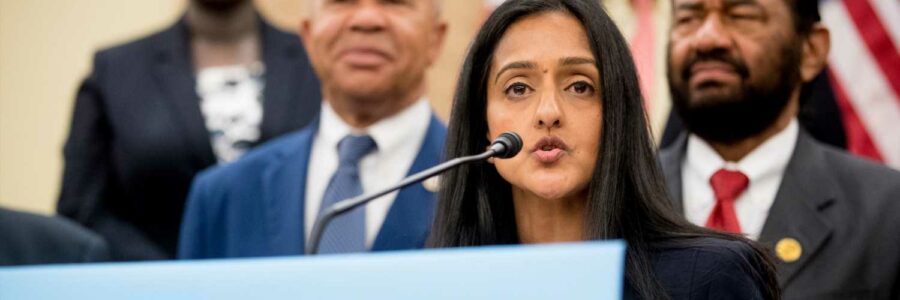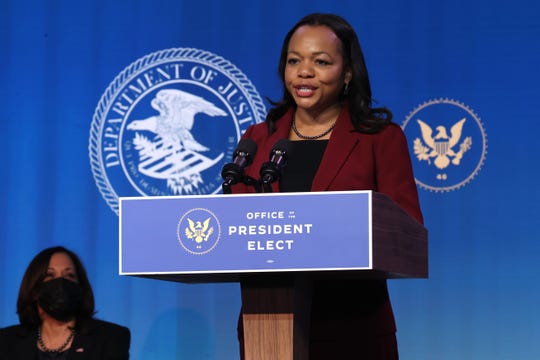
Merrick Garland’s confirmation expected, but DOJ nominees of color Vanita Gupta, Kristen Clarke face greater criticism
Even the most conservative Republican members of the Senate Judiciary Committee had few hard questions for attorney general nominee Merrick Garland.
And when the full Senate finally votes on the federal appeals court judge’s nomination, he is expected to win substantial bipartisan support.
Yet the fates of two other top Justice nominees do not share exactly the same clear path, having drawn unusually bitter criticism from Republicans and conservative groups before their confirmation hearings.
Confirmation hearing: Merrick Garland calls Capitol riot probe ‘first priority’
Vote expected soon: Witnesses praise Merrick Garland
Vanita Gupta, nominated to Justice’s third-highest ranking post as associate attorney general, and Kristen Clarke, the president’s pick to lead the department’s Civil Rights Division, have been swept into a campaign attached to hot-button issues of race and police misconduct. If confirmed, Gupta would serve as the first woman of color in the post, while Clarke would become the first Black woman to hold the Civil Rights job.
Vanita Gupta, president of the Leadership Conference on Civil and Human Rights, speaks in May against the Trump administration's decision to add a question on citizenship to the 2020 Census. (Photo: Andrew Harnik, AP)
Republicans call Gupta anti-police, but police unions support her
Some of the most pointed attacks have targeted Gupta, Justice’s former acting Civil Rights chief, who has been accused in part by Republican state attorneys general and the conservative Judicial Crisis Network of supporting efforts to defund police.
Yet that opposition has given rise to a powerful alliance that is rallying to the defense of Gupta as she prepares to face lawmakers’ questions Tuesday before the Senate Judiciary Committee. Gupta is set to testify along with Lisa Monaco, nominated to serve as deputy attorney general. But Gupta is expected to draw the most attention.
Rarely have police chiefs and law enforcement’s powerful labor organizations joined forces, but they are offering unmitigated support for Gupta, despite her close scrutiny of police departments as the acting Civil Rights chief in the Obama administration.
“She always worked with us to find common ground even when that seemed impossible,” said Patrick Yoes, president of the Fraternal Order of Police, the nation’s largest police union, in a letter to the Senate panel. “Although in some instances our disagreements remain, her open and candid approach has created a working relationship that is grounded in mutual respect and understanding.
“This extensive interaction with Ms. Gupta over a period of years,” Yoes said, “informs our belief that, if confirmed as Associate Attorney General, she will continue her practice of working with us to find solutions.”
The support has been echoed by current and former police chiefs who cast her as a “strategic problem solver” who comes to the job at a time when public confidence in law enforcement has been called into question.
“Ms. Gupta has demonstrated a seriousness and willingness to understand the intense challenges, and even dangers, facing police officers with the intent of improving policing at large without degrading the overwhelming number of brave and honorable police officers,” a coalition of current and former law enforcement leaders wrote to the committee.”
Obama with Laurie Robinson, right, Clarence J. Robinson Professor of Criminology, Law, & Society at George Mason University, and Charles Ramsey, left, then commissioner of the Philadelphia Police Department, during a meeting about his Task Force on 21st Century Policing. (Photo: Pablo Martinez Monsivais, AP)
Gupta, according to the statement she is set to deliver Tuesday, acknowledged the police support at a consequential time for law enforcement.
“When approaching the most entrenched problems of our time, I have been able to forge alliances across the political spectrum and build relationships of trust,” Gupta is expected to tell lawmakers.
The support is striking given the Obama administration’s aggressive pursuit of troubled police departments. While the Trump administration launched one investigation into a law enforcement agency during its four years, the Obama administration opened 25 inquiries into “patterns and practices” of conduct in police agencies in eight years.
Opponents, while noting the unusual police endorsements, have seized on that record, asserting Gupta has “demonstrated a hostility to rank and file law enforcement.”
“Should she be entrusted with making policies that will affect all local law enforcement and prosecutors, the result will be higher crime rates, more families torn apart by homicides and other violent crime, and neighborhoods where kids feel like they have no choice other than to take part in a life of crime,” Republican attorneys general from Indiana, Arkansas, Oklahoma, Texas and Louisiana said in a letter to the committee.
The claims have been amplified as part of a media blitz by the conservative Judicial Crisis Network, which has aired ads depicting Gupta as anti-police.
Confronting claims of anti-Semitism
Clarke, president of the Lawyers’ Committee for Civil Rights Under Law, is awaiting a confirmation hearing. Opponents have called into question her her nomination, drawing on an incident more than 25 years ago when her Harvard student group hosted an author accused of promoting anti-Semitic views. Clarke acknowledged in a January interview with the Jewish Forward that she regretted the episode with author Tony Martin.
“Giving someone like him a platform, it’s not something I would do again,” Clarke said.
During one of the most animated parts of Garland’s confirmation hearing last month, Sen. Mike Lee, R-Utah, signaled that he intended to explore Clarke’s views and question her suitability to lead the Civil Rights Division.
Kristen Clarke, president of the Lawyers’ Committee for Civil Rights Under Law, says the Biden administration needs to undo “extensive damage” in enforcing civil rights laws. (Photo: Chip Somodevilla, Getty Images)
Lee’s inquiry prompted a forceful and personal response from Garland, whose Jewish grandparents fled anti-Semitism and persecution.
“You know my views on anti-Semitism; no one needs to question those,” Garland told Lee. “I’m a pretty good judge of what an anti-Semite is, and I do not believe that she is an anti-Semite. And I do not believe she is discriminatory in any sense.” (The Anti-Defamation League, in expressing its endorsement, also referred to Clarke’s “steadfast support in the fight against anti-Semitism.”)
Garland went further, telling Lee that both Clarke and Gupta had his “complete confidence.”
DOJ’s ‘moral center’
The nominations come not only during a transition of government but following a summer marked by social justice protests, prompted by deaths and injuries of Black men and women during police encounters, including George Floyd and Breonna Taylor.
The incidents highlighted questionable law enforcement tactics and called attention to the Trump Justice Department’s departure from enforcement strategies that had sought to hold police agencies accountable for misconduct.
Civil rights advocates have argued that Trump’s deference to law enforcement seriously undercut confidence in policing in Black communities, and Biden vowed new scrutiny of police tactics led by a reinvigorated Civil Rights Division.
“We need this administration to make fighting white supremacy, confronting racial violence, addressing police violence and tackling rampant voter suppression topline priorities,” Clarke said during a December online meeting Biden hosted with civil rights leaders prior to her nomination.
Biden’s promise to make civil rights a top priority was followed by drawing Gupta, the CEO of the Leadership Conference on Civil and Human Rights, and Clarke from the top ranks of civil rights advocacy, as his nominees to the top Justice posts, along with Monaco, a former Justice veteran who once served as chief of the National Security Division.
Biden has made no secret of his regard for the Justice Department’s civil rights mission.
“The Civil Rights Division represents the moral center of the Department of Justice and the heart of that fundamental American ideal that we’re all created equal and deserve to be treated equally,” Biden said when introducing his team of justice nominees in January.
In his endorsement of Biden’s nominees, Art Acevedo, president of the Major Cities Chiefs Association, said the Justice leadership team will confront “a complex set of issues,” from questions about law enforcement tactics, violent crime and criminal justice reform to a troubling revival of domestic extremism.
“The team President Biden has nominated is immensely qualified for this responsibility,” Acevedo, police chief in Houston, wrote in a letter to the committee. “This experience will be invaluable as they work to tackle the many challenges facing DOJ.”
Houston Police Chief Art Acevedo speaks during a press conference at HPD headquarters on Wednesday, Nov. 20, 2019, in Houston. (Photo: Jon Shapley, AP)
Source: Read Full Article


